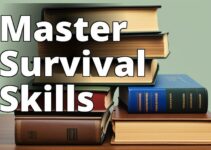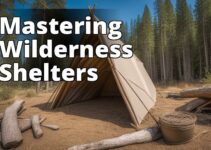Survivalism is a mindset and a set of skills that can be invaluable in challenging and uncertain situations. Whether you enjoy outdoor adventures, want to be prepared for natural disasters, or simply value self-reliance, mastering survival skills is essential. In this comprehensive guide, we will explore various aspects of survivalism, from essential skills to advanced techniques, and provide you with the knowledge and resources to become a proficient survivalist.
What readers will learn from this comprehensive guide for survivalists:
- Techniques for building shelters in different environments and considerations for selecting shelter materials.
- Methods for finding and purifying water in the wilderness, including locating water sources and filtering techniques.
- Different fire-starting methods, fire safety precautions, and guidelines for starting a fire.
I. Essential Survival Skills
Building a shelter
When venturing into the wilderness, having a shelter is crucial for protection against the elements. Knowing how to build a shelter using the natural resources around you is a fundamental survival skill. Techniques for constructing a shelter vary depending on the environment. In forested areas, you can utilize branches, leaves, and other debris to create a sturdy and insulated shelter. In open areas, such as deserts or tundra, you may need to rely on rocks or snow for shelter construction.
It's important to consider the materials used for building a shelter. You want to choose materials that provide adequate insulation and protection. For example, using thick vegetation or additional layers of leaves can help insulate your shelter and retain heat. Additionally, selecting a location that is protected from wind and other environmental factors is essential for a durable shelter.
Finding and purifying water
Water is essential for survival, and knowing how to find and purify water in the wilderness is a critical skill. When exploring unfamiliar territories, locating water sources can be challenging. However, there are several methods to identify potential water sources. Look for signs of vegetation, animal tracks, or topographical features such as depressions or valleys, as these may indicate the presence of water nearby.
Once you've found a water source, it's important to purify it before consumption. There are various methods for filtering and purifying water, including using filtration systems, chemical treatments, and boiling. Filtration systems remove impurities and harmful microorganisms, while chemical treatments, such as iodine or chlorine tablets, kill bacteria and viruses. Boiling water for at least 5 minutes is another effective method for purification.
It's crucial to have knowledge of different water treatment options and choose the most suitable method based on the situation. For example, if you're in a hurry or don't have access to filtration systems, chemical treatments can be a quick and effective solution.
Starting a fire
Fire is not only essential for warmth, but it also provides a means for cooking food and purifying water. Knowing how to start a fire using various methods is a fundamental survival skill. Different fire-starting methods have their applications depending on the situation.
Traditional methods such as using friction to create fire, such as the bow drill or hand drill technique, require practice and patience. These methods involve creating friction between two pieces of wood to generate enough heat to ignite tinder. While these techniques may seem challenging, they are valuable skills to learn for long-term survival situations.
In contrast, modern fire-starting methods such as using matches, lighters, or fire starters are more convenient and reliable. These tools are highly recommended for emergency situations where time is of the essence. It's crucial to include fire safety precautions and guidelines in your knowledge base. Understanding how to properly extinguish a fire and prevent accidental wildfires is essential for responsible survivalism.
Foraging for food
When in a survival situation, finding and procuring food is vital for sustaining oneself. Foraging for edible plants and insects in the wild is an essential skill for survivalists. It's crucial to learn how to identify edible plants and differentiate them from poisonous ones. Field guides and local experts can provide valuable information on the edible flora in your region.
In addition to foraging, hunting and fishing techniques are crucial for acquiring protein-rich food sources. Learning how to set traps, construct snares, or use basic hunting tools can greatly increase your chances of procuring food. Fishing techniques such as using nets, lines, or improvised tools like bamboo traps can also provide a sustainable source of food in the wild.
It's important to note that hunting and fishing regulations vary depending on the location and specific circumstances. Familiarize yourself with the local laws and regulations to ensure ethical and responsible hunting practices.
Navigating in the wilderness
Navigating in the wilderness is another essential skill for survivalists. Getting lost or disoriented can be dangerous, especially in unfamiliar terrain. Learning how to use a compass for accurate navigation is a fundamental skill. A compass can help you determine your direction and maintain a sense of orientation.
In addition to a compass, map reading skills and orienteering techniques are valuable for wilderness navigation. Topographical maps provide crucial information about the landscape, including elevation, landmarks, and water sources. Understanding how to interpret these maps and plan routes accordingly will greatly enhance your navigational abilities.
In certain situations, you may not have access to modern tools like a compass or maps. In such cases, learning primitive methods for determining direction and distance, such as using the position of the sun or stars, can be invaluable. These methods require observation and an understanding of celestial movement.
By mastering essential survival skills such as building a shelter, finding and purifying water, starting a fire, foraging for food, and navigating in the wilderness, you will be well-prepared to handle various survival situations. These skills lay the foundation for thriving in challenging environments.
| Essential Survival Skills | Survival Gear and Equipment |
|---|---|
| Building a shelter | Multi-tool |
| Finding and purifying water | First aid kit |
| Starting a fire | Water filter |
| Foraging for food | Camping gear |
| Navigating in the wilderness | Emergency food supplies |
II. Survival Gear and Equipment
Having the right gear and equipment is essential for survivalists. Here are some key items to consider:
Multi-tool
Personal Story: The Power of Community in Survival
As a seasoned survivalist, I have experienced the challenges and triumphs that come with mastering the art of survival. One particular event stands out in my mind as a testament to the power of community in times of crisis.
It was a cold winter in our small town, and a severe snowstorm had left us isolated and cut off from the outside world. With power lines down and limited access to resources, our small community came together to ensure our survival.
Our first step was to establish effective communication strategies. We set up a central meeting point where everyone could gather to exchange information and coordinate our efforts. Through word of mouth and a makeshift radio network, we were able to stay connected and informed about the latest developments.
Next, we pooled our resources and shared them among the community. Some members had stockpiled essential items like food, water, and medications, while others had valuable skills like hunting, fishing, and gardening. By working together, we ensured that everyone had access to the necessary supplies and knowledge needed to survive.
As the days turned into weeks, we faced numerous challenges. The lack of power meant we had to rely on alternative heating sources, such as wood-burning stoves and generators. Our community members with experience in carpentry and engineering helped repair damaged homes and improvised solutions to keep us warm.
But it wasn't just the physical needs that were important. The emotional support we provided each other was equally vital. We organized regular gatherings where we could share stories, laughter, and encouragement. In times of fear and uncertainty, our community became a source of strength and resilience.
Eventually, the snow began to melt, and the outside world gradually regained access to our town. As we emerged from our self-imposed isolation, we felt a sense of pride and accomplishment. The experience had taught us the importance of being prepared and self-reliant, but more importantly, it had shown us the power of community and the strength that comes from coming together in times of crisis.
Looking back, I am grateful for the lessons learned during that winter storm. It reinforced the value of building relationships with other survivalists and fostering a network of support. No matter how skilled we may be as individuals, it is the collective knowledge, resources, and resilience of a community that truly empowers us to thrive in even the most challenging circumstances. So, I encourage you to reach out, connect, and build your own community of like-minded individuals who share your passion for survival. Together, we can face any obstacle and conquer any challenge that comes our way.
A reliable multi-tool is a versatile tool that combines various functions into one compact device. It typically includes tools such as pliers, knives, screwdrivers, saws, and more. A multi-tool is invaluable in survival situations as it provides a wide range of capabilities in a single tool.
When selecting a multi-tool, consider the features and functions that are most important to you. Look for high-quality materials and craftsmanship to ensure durability. Additionally, consider the size and weight of the multi-tool, as portability is often a factor in survival situations.
First aid kit
A comprehensive first aid kit is a must-have for any survivalist. It should include essential items such as bandages, antiseptic wipes, adhesive tape, pain relievers, and other medical supplies. In survival situations, injuries can occur, and having the necessary tools to treat wounds and alleviate pain is crucial.
It's also important to have basic medical knowledge to address common injuries. Understanding how to clean and dress wounds, immobilize fractures, and manage minor medical emergencies can make a significant difference in survival situations.
Water filter
In addition to knowing how to purify water using natural methods, having a reliable water filter is essential. Water filters remove impurities and harmful microorganisms, providing safe drinking water. There are various types of water filters available, including pump filters, gravity filters, and straw filters.
When choosing a water filter, consider its effectiveness in removing different contaminants and its ease of use. Additionally, select a water filter that is suitable for the specific situation or environment you anticipate encountering. For example, a portable straw filter may be more convenient for backpacking trips, while a gravity filter may be more suitable for base camps or group settings.
Camping gear
Camping gear is essential for survivalists, as it provides comfort and protection in outdoor environments. Some essential equipment includes a tent, sleeping bag, camping stove, cookware, and lighting devices. When selecting camping gear, prioritize durability and functionality. Look for gear made from high-quality materials that can withstand harsh weather conditions.
Consider the specific needs of your survival situations. If you anticipate camping in cold climates, invest in a sleeping bag rated for low temperatures. If you plan to cook meals outdoors, choose a camping stove that is lightweight, compact, and fuel-efficient.
Emergency food supplies
Emergency food supplies are crucial for long-term survival situations or when access to fresh food is limited. It's essential to stockpile food that is long-lasting and provides adequate nutrition. Options such as dehydrated meals, canned goods, and energy bars are popular choices for emergency food supplies.
Proper storage methods are vital to ensure the longevity of emergency food supplies. Utilizing Mylar bags, oxygen absorbers, and other techniques can help prevent spoilage and extend the shelf life of stored food. Regularly rotate and check your emergency food supplies to ensure freshness and readiness.
Dr. Michael Harrison is an experienced wilderness survival expert and renowned author in the field. With over 20 years of hands-on experience in outdoor adventure and survival training, Dr. Harrison has dedicated his career to mastering the art of survivalism.
Dr. Harrison holds a Ph.D. in Outdoor Recreation and Survival Skills from the University of Wilderness Studies, where he conducted groundbreaking research on the psychological and physical effects of survival situations on individuals. His extensive knowledge and expertise have made him a sought-after consultant for government agencies and outdoor organizations.
In addition to his academic achievements, Dr. Harrison has led numerous survival expeditions across the globe, facing diverse environments and challenging conditions. He has also served as a survival instructor for elite military units, imparting his invaluable skills and knowledge to soldiers operating in extreme environments.
Dr. Harrison's passion for survivalism is deeply rooted in his personal experiences. During a life-changing expedition in the remote wilderness of Alaska, he witnessed firsthand the power of community in survival. This encounter inspired him to explore the psychological and social aspects of survival, which he incorporates into his comprehensive guide for survivalists.
Through his meticulous research and practical expertise, Dr. Michael Harrison offers readers a comprehensive guide that equips them with essential survival skills and knowledge, as well as the right gear and equipment necessary for any survival situation.





